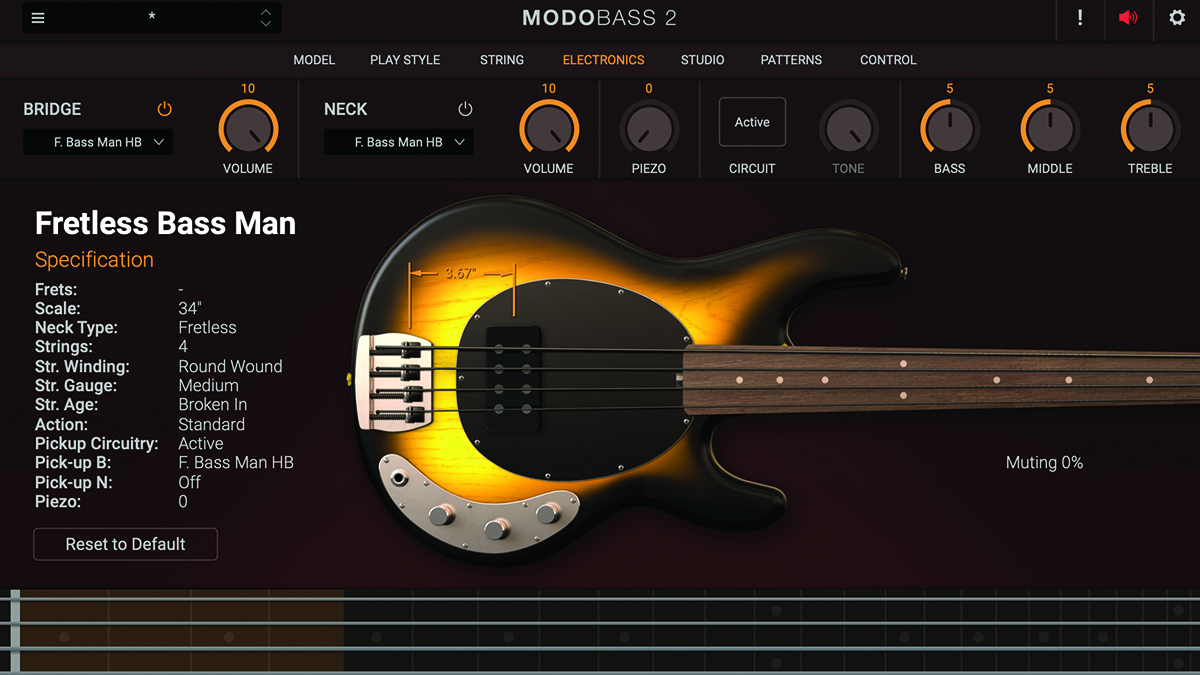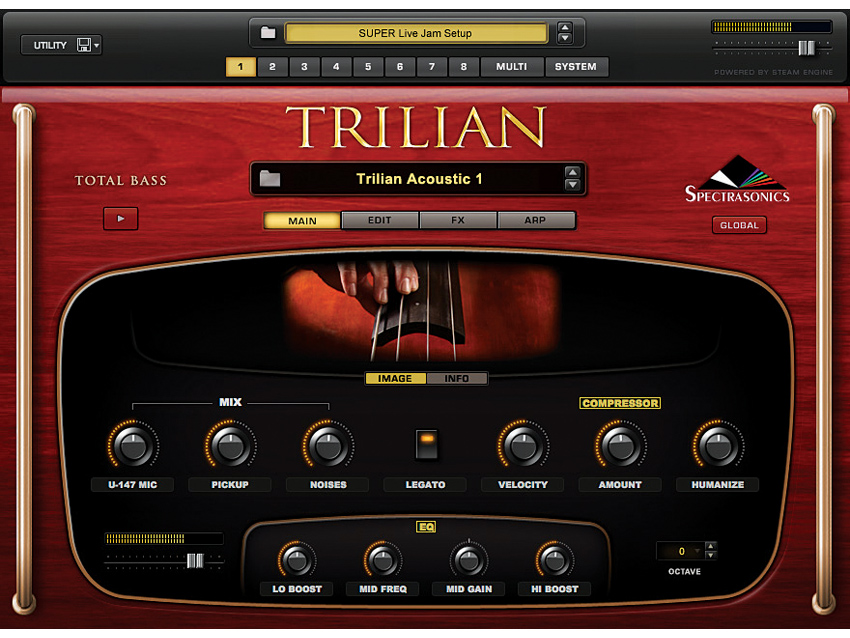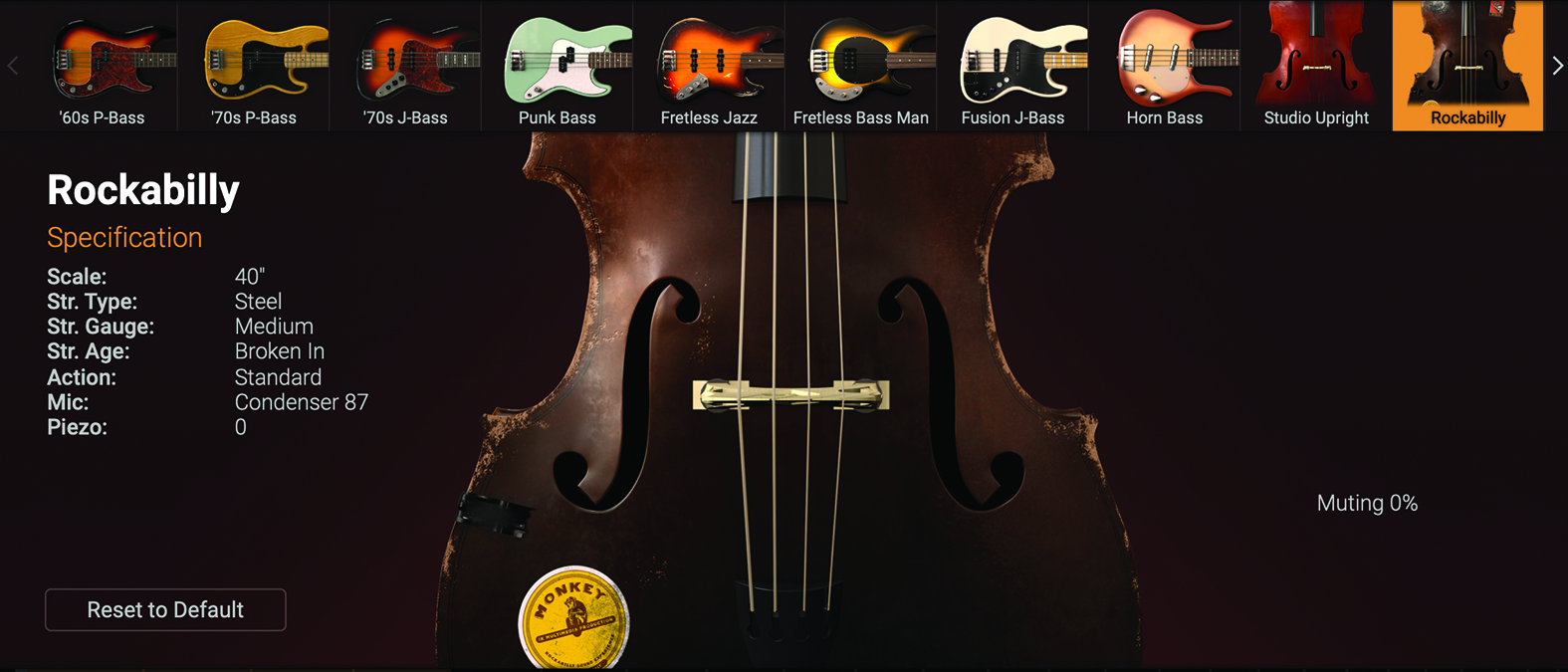MusicRadar Verdict
Though the modelling is top-notch, it’s IK’s considered approach for letting us play its basses in a multitude of styles that makes the most lasting impression.
Pros
- +
22 exceptionally modelled virtual basses.
- +
A whole wealth of control and customisation options.
- +
Fretless models provide even more tones and moods.
- +
Easy-to-navigate interface.
Cons
- -
Some slowdown/stuttering.
MusicRadar's got your back
IK Multimedia MODO Bass 2: What is it?
It used to be a common slight levelled at young bass guitar wielders, that the only reason they took up their four-stringed instrument was because they’d thrown in the towel with learning guitar, and plumped for something easier. It’s a juvenile dig typically made by those who’ve little understanding of the amount of skill, rhythmic and melodic dexterity required to handle a bass properly.
While production and arrangement innovations come and go, the bass guitar still remains a fixture across genres. From funk to rock, R&B to rap, solid, ambidextrous basslines, driven by human finger-flair and melodic improvisation, aren’t going anywhere anytime soon.
While many of us may have a dusty old bass kicking around in our home studios, and naively assume that laying down an adequate bassline is a quickish job, getting a solid and considered bass tone, and refining the detail and impact of our basslines can steer a track into a much more professional-sounding sphere.
IK Multimedia’s MODO Bass 2 essentially grants the user with a complete virtual bassist, with up to 22 basses including an opulent new double bass model and a few fretless options. Building on the initial entry in the MODO Bass line, first released back in 2016, MODO Bass 2 is a slick refinement of what made that virtual instrument – the first properly physically modelled electric bass, we might add – such a staple of many of our VI libraries.
IK Multimedia MODO Bass 2: Performance and verdict
MODO Bass 2’s main window provides seven different tabs, each of which grant deeper command of your chosen bass instrument (selected on the first page). Choosing our MIDI keyboard as the main controller allows us to audition each bass in turn.
As we audition each one, what’s startlingly apparent is how bona-fide these modelled basses sound
What’s startlingly apparent is how bonafide these modelled basses sound. It’s testament to IK’s extremely meticulous modelling approach, rendering various pickup types, string gauges, ages and playing styles with aplomb, each tweak of which can massively affect our bass’s sound.
While we’re familiar with IK’s classic P-Bass and Jazz bass offerings from the first MODO Bass, our first port of call is the new fretless models.

The Studio Upright sound is utterly magical and classy. The flowing note legato options, controlled via our MIDI keyboard, allow us to apply spritely, kinetic workouts and sliding ominous rumbles to our tracks with minimal effort.

• Spectrasonics Trilian Bass
With more than 60 authentic-sounding basses, expressive potential and effects abound.
• Native Instruments Scarbee Rickenbacker Bass
NI’s low end sample instrument has numerous of ways of controlling it, plus a tone-shaping virtual amp.
Among the eight new model offerings are an electric fretless Jazz and a Rockabilly-style upright bass for those late-night shindigs. With such a smorgasbord of bass options, you are sure to find a decent tone for all types of track.
IK provides numerous ways to perform, edit and mould your rhythm section with these basses. Via seven distinct views, users are granted the ability to choose the model, adjust the play style, select string type, augment the pickups and internal electronics, situate virtual mics in front of your virtual cab, and select from a range of preset bass patterns and adjust your control settings.
Spending some time with the brand new Patterns browser reveals a sample library-like navigation system, with oven-ready bassline types organised by genre, key and play style. The ability to quickly check out different bass parts provides one of the shortest routes to solid rhythmic starting points.
Bass for your buck
In contrast to other bass makers which only offer basic approaches to their samples, IK allows your virtual fingers to touch its four-stringed arsenal in a variety of different ways, from the straightforward Finger-led approach to a metal and funkadelic Slap mode. Punkier, more garage-rock players might want to opt for a Picked style, while Mute allows you to dial in more damping to the tone of any aforementioned style. This is an instant silencer to those who scoff at the abilities of virtual instruments to capture the character of genuine players.
While not as instantaneous or instinctual, moulding a realistic, genre-fitting bassline with MODO Bass 2 is a breeze. There are also options to choose where on the bass your hypothetical fingers will interact with the string. Add this to string selection, 32 virtual pickups and seven bass effect stompbox pedals, and you can’t help but wonder if software now has the edge. (Sorry, session players.)
Verdict
MODO Bass 2 is, without question, the finest virtual electric bass instrument(s) we’ve so far used, the only noticeable downside being some occasional popping and note lag as we quickly laid down new bass runs without waiting for the samples to fully load. We daresay a more RAM-packed workstation will handle things more smoothly.
If you’re reliant on bass samples, or you’re suffering from a lack of low end inspiration, MODO Bass 2 provides a global insight into a pro-bass player’s mindset, and the end results sound indistinguishable from hiring a bass major for the day.
MusicRadar verdict: Though the modelling is top-notch, it’s IK’s considered approach for letting us play its basses in a multitude of styles that makes the most lasting impression.
IK Multimedia MODO Bass 2: The web says
"Whether you’re making rock, pop, blues or other similar styles of music, Modo Bass 2 will give you all the bass flexibility you need without ever needing to play or record a real bass guitar."
MusicTech
IK Multimedia MODO Bass 2: Hands-on demos
ikmultimedia
HIFIMIDI
Emlyn In The Mix
dancetech
IK Multimedia MODO Bass 2: Specifications
- Mac (64-bits): Minimal: Intel® Core™ 2 Duo or Apple M1, 4GB of RAM (8GB suggested), macOS 10.13 or later. Runs natively on Apple’s M1 processors.
Supported Plug-in formats (64-bit): Audio Units, VST 2, VST 3, AAX. - Windows (64-bits): Minimal: Intel® Core™ 2 Duo or AMD Athlon™ 64 X2, 4GB of RAM (8GB suggested), Windows 10 or later. Requires an ASIO compatible sound card. Supported Plug-in formats (64-bit): VST 2, VST 3, AAX.
- CONTACT: IK Multimedia
Computer Music magazine is the world’s best selling publication dedicated solely to making great music with your Mac or PC computer. Each issue it brings its lucky readers the best in cutting-edge tutorials, need-to-know, expert software reviews and even all the tools you actually need to make great music today, courtesy of our legendary CM Plugin Suite.











